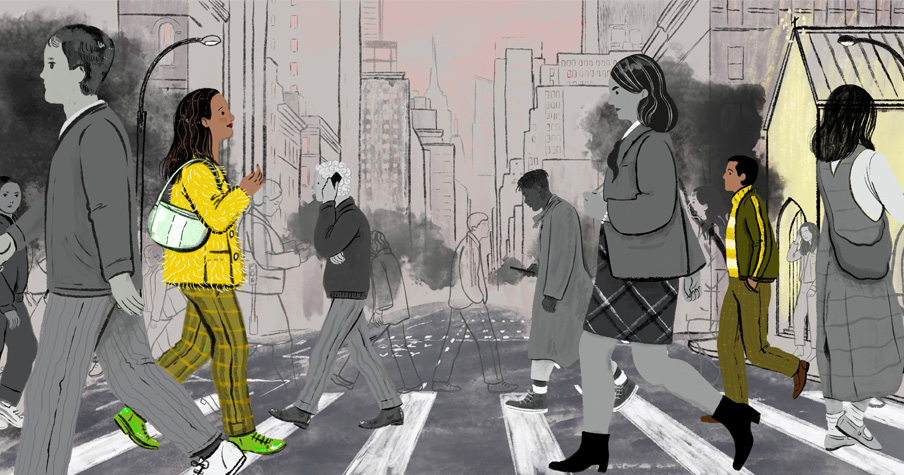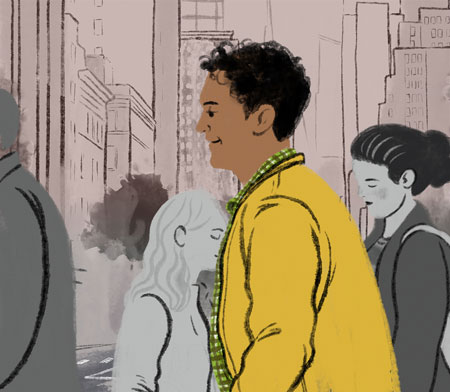
Illustrations by Raquel Aparicio
Fatima Vazquez-Molina grew up in the Maryland suburbs of Washington, D.C., the eldest of two children of Latino immigrants. She attended parochial schools and a predominantly Hispanic girls Catholic high school before matriculating to The Catholic University of America (CUA), just a few miles from her home, as a commuter student.
In high school, she had told her parents she wanted to study theology, and recalls them asking “How is this going to pay the bills?” She persisted, and earned a bachelor’s degree in theology with a minor in Hispanic Studies in 2023.
“It was hard going into those theology classes,” she recalls. “I was the only Latina in a predominantly male environment, and while I wouldn’t say the odds were against me, there were a lot of things that were just very new – a culture shock, really.”
Attending during the pandemic presented another challenge but CUA exposed her to the diversity of the Church, she says, enabling her to see theology in multiple dimensions. By senior year she was back on campus, serving as a minister, now living in the dorms for a semester and working with the Center for Cultural Engagement where she introduced a Spanish language Mass, Las Mañanitas to Our Lady of Guadalupe, and a COVID Día de los Muertos altar.
“There were a lot of experiences I made for the community, and not just for the Latinos. Those experiences really opened my eyes to how we all see theology and seek it in such varied ways,” she says.
Matters of demography
By the time Vasquez-Molina graduated and returned to her high school alma mater as a campus minister, her parents had warmed to her dream of studying theology, and encouraged her to pursue graduate studies. At CUA she had read some of the groundbreaking demographic research of Hosffman Ospino, Ph.D., a professor of Hispanic Ministry and Religious Education at Boston College since 2007, and chair of its Department of Religious Education and Pastoral Ministry. A Colombia native, Ospino has served as the principal investigator and author of a series of nationally recognized studies on the transforming presence of Hispanic Catholics in parishes, schools, and organizations in the United States, including the 2014 National Study of Catholic Parishes with Hispanic Ministry. At that time, there were about 4,300 such parishes; today there are 4,479, about 27 percent of all American Catholic parishes.
As a doctoral candidate attending a conference of the Academy of Catholic Hispanic Theologians of the United States in 2004, Ospino met Timothy Matovina, Ph.D., a new professor of Theology at Notre Dame University; the two struck up a professional and personal friendship around shared interests in faith and culture, notably the experience and influence of Latino theology in the U.S. Catholic Church.
A prolific author and dedicated teacher, Matovina’s award-winning 2012 book, Latino Catholicism: Transformation in America’s Largest Church, explored 500 years of the Latino Catholic experience in America and the ways the Church, its fast-growing Latino population, and American culture continue to transform one another.
“Hispanic ministry in the Catholic Church is often perceived, even by the leadership, as Spanish language ministry,” Matovina says. “So it’s for immigrants. But there are second and third generations that are either bilingual or do not even speak Spanish very well. As a Church, and even as universities, we haven’t done nearly enough to engage this younger generation and call them forth.”
Their research reveals that some 45 percent of the Catholic population (roughly 32 million people) in the U.S. are Hispanic. Moreover, Hispanics comprise about 60 percent of Catholics under the age of 18, and they primarily speak English. These trends are occurring simultaneously with declines in the Euro-American Catholic population, with a median age of 55 as compared to 29 for Latinos. And, as Ospino notes, birth rates among second, third, and fourth generation Hispanics now exceed the population growth from immigration.
“We had been dreaming of a project that would be directed at younger people,” Matovina says. “Not just Latinos, but people who serve in Hispanic ministry, young people who have a deep and abiding interest in and the ability to engage master’s level study beyond the Diocesan certificate and to earn a credential to exercise leadership in many different arenas.”
A way forward
The dream project eventually became Haciendo Caminos (“making pathways”) a multi-level effort conceived and led by Notre Dame and Boston College under the leadership of Ospino and Matovina. Funded by a $7.9 million Phase III Pathways for Tomorrow Lilly Endowment grant, Haciendo Caminos has brought together 18 Catholic partner institutions to develop inter-institutional capacity through theological and ministerial graduate degree programs; to identify and help train a new generation of lay ecclesial leaders serving the Latino Catholic Church; and to build support networks among local dioceses, parishes and/or other organizations.
The largest portion of the grant ($3 million) is dedicated to a competitive Fellowship fund, with fellowships awarded on a sliding scale at a maximum of $30,000 per student for master’s level study. Haciendo Caminos will provide at least 100 fellowship grants throughout the five-year grant period, awarded on a rolling basis; the funds can be expended by the Fellows in any way needed to assist them in the completion of their course of study – be it tuition, housing, or personal support.
As of mid-August, 75 fellows were actively enrolled in graduate programs at the 18 partner institutions. Three Fellows already graduated in May 2024, $1.4 million in funding has been awarded, and $1.6 million in fellowship funding remains in the grant.
“Somebody finally understood”
Fatima Vasquez-Molina graduated from Catholic University in 2023, returned home, and spent a year working as a campus minister for her former high school while taking online graduate theology classes at Boston College. She had met Hosffman Ospino as an undergraduate, and had immersed herself in his thinking; she remembers vividly the way he described how a Latino experiences faith, how a community comes together to “share the bread of life.” And it was at that moment that she said, “This is what I want to do. Somebody finally understood.”
Fatima is now a Haciendo Caminos Fellow, and her grant will allow her to spend the 2024-25 academic year studying full time in Boston to complete a master’s degree in Theology and Ministry. “I’m still sometimes the only Latina in many of my classes, and I’ve learned to be OK with that,” she says. “I’ve learned not to be afraid of sharing my story through the Latino ministry lens.”
Rafael Quevedo is a Fellow of the Haciendo Caminos initiative studying at the Franciscan School of Theology at the University of San Diego. Like Vasquez-Molina, he is a first-generation undergraduate, the eldest child of Mexican immigrants, and completed his undergraduate degree at San Diego State University at 24 with the assistance of Pell Grants.
Quevedo, 31, worked for years in Youth Ministry for the Diocese of San Diego and now works at Cristo Rey San Diego High School (a national network of high schools offering rigorous academics and professional work experience). He is married and the parent of three children, all below the age of five.
“I started taking classes at the Diocesan Institute, and I just fell in love with theology,” he says. “But they teach at basically an undergraduate level, and I wanted more.” He enrolled in the M.Div. program at Franciscan School of Theology of the University of San Diego, and shortly after learned that his two-year-old daughter needed back surgery.
“I can only say that God put the Haciendo Caminos Fellowship in my lap,” he says. “We were trying to figure out how we were going to pay for surgery and everything else. The flexibility of the Fellowship funds has been a gift.”

At the Summit
Quevedo is now on track to complete his master’s degree program in May 2025, he says. His story of determination and purpose is similar to many that Juan Miguel Alvarez, Director of Haciendo Caminos, has heard. The youngest of six children born to an immigrant family from Mexico, Alvarez grew up in Colorado Springs, Colo., and remembers the entire family engaged in migrant field work during summers. He earned an undergraduate degree in Theology in 2014 and an M.Div. in 2023 (working in parishes and a Catholic high school in between), both from the University of Notre Dame. In 2023, he was appointed to his current position, which includes coordinating the fellowship granting process, event planning and overseeing the local efforts of Haciendo Caminos partners across the country. Significantly, as Matovina observes, "Juan Miguel is a mentor and spiritual guide of the whole movement we call Haciendo Caminos.”
Alvarez planned and organized Haciendo Caminos’ Vocations Summit in August 2024 on the serene campus of Dominican University in River Forest, Ill., near Chicago. Nearly 100 young men and women, mostly undergraduate students and seekers in the mold of current Fellows Vasquez-Molina and Quevedo (both of whom made the trip to support the meeting) were in attendance, trying to discern a calling to serve a Church undergoing generational change.
Others included Partner representatives, guest speakers, and a handful of current Fellows. Ospino and Matovina made presentations. Faculty members and dedicated partners led panel conversations, plenary sessions and small group discussions. Current students provided testimonies about their experiences. And morning prayer and Mass, dinners and socials celebrated community in the magnetic and joyous Latino tradition. The energy and spirit were palpable.
Alvarez is detail-oriented, energetic, unceasingly patient, and completely dedicated to leading a program that is continuously evolving even as it moves ahead at full-tilt. He is confident that the initiative will continue once the Lilly Pathways grant funding has expired.
“Haciendo Caminos is opening doors for more people to pursue leadership positions,” he says. “All 18 partner institutions already have been engaged in outreach and formation of Latino communities; most have been providing financial assistance to support the initiative on their campuses, and all 18 fully intend to continue their work into the future. The partnership has established a foundation that will enable us to advance our local institutional efforts, to learn from one another, and build stronger collaborations in the future.”
Boston College’s Ospino echoes Alvarez.
“ These young people are a gift that God is giving the Catholic Church in the United States – their leadership, their passion, their energy, their desire to evangelize and be disciples. There are many challenges, and there’s a gift sitting right at our doorstep.
“First and foremost, this is about recognizing the gift that God wants to give us.”